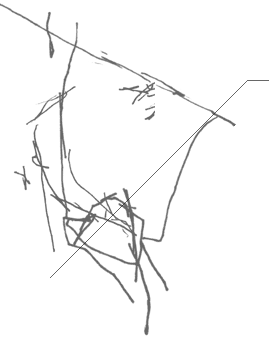Friday, December 19, 2025 |
||

|

by Michael Goldberg
Monday July 16, 2001
Rufus Wainwright Makes One Like They Used To Make 'Em
A young man following in the footsteps of Randy Newman and Van Dyke Parks records a masterpiece
|
|||
|
I have come to believe that the best time for new music is when all bets are off and the larger record companies are even more clueless than usual about what might sell. Those are times when the really interesting and offbeat stuff slips through the cracks and gets a real shot. Times like right now, as the teen-pop bloom fades, and Radiohead debut in the Top 10. How else to explain the release last month of the extraordinary second album from Rufus Wainwright, Poses?
Poses is out of time. Literally. Musically, it just doesn't exactly fit into any particular year. Certainly not 2001. It's not teen pop. It's not hard rock or hardcore hip-hop or downer metal or vacuous modern pop or pseudo-alternative or power-punk. Yet, to my ears, it sounds perfect for 2001. Rufus Wainwright makes an odd pop music that hearkens back to, say, Cole Porter or even Frank Sinatra ("Only the Lonely," "September of My Years") — but by way of Elvis Costello. There's also some Elton John (you'll hear that in Wainwright's vocal for "Grey Gardens") and Van Dyke Parks (who co-produced two tracks on Wainwright's 1998 debut). Not to mention Randy Newman (in terms of the music and some of the arrangements), only where Newman's voice is an acquired taste (great, but in a very non-traditional sense), Wainwright has a gorgeous pop voice, and he can really sing. The way he stretches words, and the dynamic shifts in his vocal performances, are breathtaking and just, well, wonderful. Poses takes some shifting of gears, especially if you typically listen to Radiohead or Mouse On Mars or Tricky or Tool. At first, I didn't get it. Hmm, seems to have some good melodies, but it's so middle-of-the-road, with some left turns into cabaret pop, I thought. And it's so old-school. I mean really old-school. So I listened to it a few times, put it aside and then listened to it some more. And then listened to it some more. Then went back to his debut, which I now think is also quite amazing. Then back to Poses. And of course now I'm hooked. Some of the credit must go to Dreamworks Records president Lenny Waronker, who is listed as "executive producer." Poses is a Lenny Waronker kind of record, the kind of record Waronker would have produced, if he were still producing records. Years ago he made records with Randy Newman and Brian Wilson, Maria Muldaur and Rickie Lee Jones and others. They were records that had a certain Americana feel to them, but informed by a keen intelligence and powerful spirit. Signing Rufus Wainwright and understanding his potential was a genius move on Waronker's part, and I'm sure he must be major proud of Poses. Rufus Wainwright may be an emotive singer and a talented musician (and arranger) with a gift for composition, but he's also quite a lyricist. The album opener, "Cigarettes and Chocolate Milk," is in part on ode to excess. "Cigarettes and chocolate milk/ These are just a couple of my cravings/ Everything it seems I like's a little bit stronger/ A little bit thicker/ A little bit harmful for me.../ A little bit harder/ A little bit deadly." There's a lot more to it than that, of course. Later he sings, "You got to keep in the game/ Retaining mystique/ While facing forward/ I suggest a reading of 'A Lesson in Tightropes' or 'Surfing Your High Hopes' or 'Adios Kansas'...." I get a picture here of a young man who has already lost his innocence, reflecting on leaving the small town for the city, struggling with his impulses and desires while attempting to make something of himself. But that's "Cigarettes and Chocolate Milk" through my eyes; you might see something very different. And like the best writers, Wainwright writes lyrics open to interpretation. In his recent bio, Wainwright describes the subject of the song "Poses" as "a young, attractive bachelor who goes to the city and leaves as a complete drug addict... the fall of a young man." The song itself isn't quite so direct. "I did go from wanting to be someone/ Now I'm drunk and wearing flip flops on Fifth Avenue.../ Once you've fallen from classical virtue/ Won't have a soul for to wake up and hold you." But perhaps the best line in "Poses," the one that shows the vacuousness of a particular lifestyle, is this one: "There's never been such a grave matter/ As comparing our new brand-name black sunglasses." Rufus is the son of folk-rockers Loudon Wainwright III and Kate McGarrigle, two major musical talents. Clearly, musical talent is in his bones. And you can hear his parents — faintly — in Rufus Wainwright's work. Mostly in a subtle way, in the way that the music here is elegant like his mother's, and has a bit of humor, like his father's. He even includes one song that his father wrote, "One Man Guy." There's been a lot of talk during the past five years about low-cost recording technology allowing artists to make great-sounding albums in home studios. Not only is it possible — it's been done over and over. Poses, however, demonstrates why it's good, on occasion, to have the resources of a well-funded label (in this case Dreamworks) and to be able to afford to go into commercial studios with established producers. Poses is an exquisite-sounding record, with perfect orchestration and arrangements. It doesn't sound like an album made in someone's bedroom or garage studio. I'm not saying that all albums should be made this way; I'm just glad that Rufus Wainwright had the opportunity to make this one. |
||||